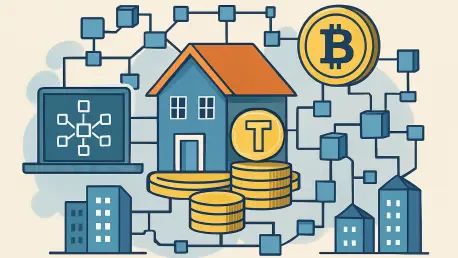The landscape of commercial real estate is undergoing a profound transformation, driven by the disruptive potential of blockchain technology, which addresses persistent challenges like illiquidity and high entry costs. By converting traditional property ownership into digital tokens that can be traded seamlessly on decentralized platforms, this cutting-edge innovation is reshaping the industry. Picture a world where owning a fraction of a towering office building or a bustling retail center doesn’t require a fortune—blockchain makes this a reality through tokenization. Far from being a passing trend, this development is redefining how investments are made and managed in the real estate sector. It’s an exciting shift that promises to democratize access and inject unprecedented flexibility into a historically rigid market. This article explores the mechanisms behind this change, the platforms leading the charge, and the broader implications for investors and the industry at large.
Unlocking Access Through Tokenization
The concept of tokenization lies at the core of blockchain’s impact on commercial real estate. This process involves dividing ownership of high-value properties into digital tokens that exist on a blockchain, allowing investors to purchase fractional shares rather than entire assets. This approach breaks down the financial barriers that have long excluded smaller players from lucrative markets. Instead of needing millions to invest in a single property, individuals can now acquire a stake for a fraction of the cost. Moreover, these tokens can be traded continuously on blockchain-based exchanges, eliminating the delays and intermediaries that slow down traditional transactions. The result is a market that operates with the speed and accessibility of stock trading, transforming real estate into a more inclusive and dynamic asset class that appeals to a broader range of investors seeking to diversify their portfolios.
Beyond accessibility, tokenization introduces a level of transparency and efficiency previously unseen in the sector. Blockchain’s immutable ledger ensures that every transaction is recorded securely, reducing the risk of fraud and enhancing trust among participants. This technology also simplifies the process of ownership verification, as digital tokens serve as indisputable proof of a stake in a property. For markets often criticized for opacity, this shift offers a refreshing change, enabling clearer pricing and faster deal closures. Additionally, the ability to fractionalize ownership means that liquidity is no longer tied to selling an entire property—tokens can be bought and sold in smaller increments, catering to varying investment appetites. As this model gains traction, it’s clear that tokenization is not just altering how investments are made but also reshaping fundamental perceptions of property ownership in the commercial space.
Pioneering Platforms Driving Change
Several decentralized platforms are at the forefront of this blockchain revolution in commercial real estate, leveraging advanced technology to redefine investment norms. Companies like Propy, Mata Capital, and Elevated Returns are harnessing blockchain infrastructure to facilitate instantaneous property transfers and issue security tokens that represent ownership stakes. For instance, Mata Capital’s €350 million security token offering on the Ethereum network demonstrates the sheer scale at which tokenization can operate, bringing institutional-grade investments within reach. Similarly, Elevated Returns’ tokenization of a significant stake in the St. Regis Aspen Resort highlights how real estate can mirror the tradability of financial securities. These platforms are not merely adapting to change—they are actively rewriting the rules by making high-value assets more accessible and liquid for a global audience.
In addition to streamlining transactions, these platforms are integrating innovative tools to enhance the investment experience. Technologies such as Non-Fungible Tokens (NFTs) are being utilized to create unique digital records of ownership, ensuring that each token is distinct and verifiable. This adds a layer of security and individuality to tokenized assets, setting them apart from traditional investment vehicles. Furthermore, the use of smart contracts—self-executing agreements coded on the blockchain—automates processes like dividend distribution and ownership transfers, minimizing human error and reducing costs. By combining these advancements with blockchain’s inherent decentralization, platforms are eliminating the need for cumbersome intermediaries, thus speeding up operations and lowering expenses. The pioneering efforts of these companies signal a broader movement toward a more efficient and inclusive real estate market driven by technological innovation.
Ethereum’s Ripple Effect on Real Estate
While not directly focused on property, the success of blockchain-based financial products like the Fidelity® Ethereum Fund (FETH) underscores a growing trust in the underlying technology, particularly the Ethereum network, which many tokenization platforms depend on. FETH, an Ethereum-backed investment vehicle, has gained significant traction among institutional investors, reflecting confidence in blockchain’s reliability and scalability. This acceptance has a cascading effect on other sectors, including real estate, where Ethereum serves as the backbone for many decentralized applications. As trust in blockchain grows through such financial instruments, it encourages more stakeholders to explore tokenized real estate, knowing that the infrastructure supporting these assets is robust and widely endorsed by major players in the financial world.
This broader adoption of blockchain technology creates fertile ground for innovation in commercial property markets. The stability and security of Ethereum’s network provide a reliable foundation for tokenization platforms to build upon, ensuring that transactions are seamless and secure. This is particularly crucial for real estate, where high-value assets demand airtight systems to prevent fraud and ensure compliance. The momentum generated by Ethereum’s widespread use also attracts developers and investors to experiment with new applications, further accelerating the pace of change. As blockchain continues to prove its worth in diverse areas, its influence on real estate becomes more pronounced, fostering an environment where tokenized assets are not just feasible but increasingly seen as a mainstream investment option. This synergy between financial products and property innovation is a key driver of the sector’s ongoing evolution.
Transforming Market Structures
Blockchain technology goes beyond facilitating trades—it fundamentally alters how commercial real estate is valued, managed, and accessed. Innovations like digital twins, which are virtual replicas of physical properties, allow investors to analyze performance metrics in real time, offering deeper insights into asset potential. Meanwhile, integration with Decentralized Finance (DeFi) protocols enables instant access to capital through mechanisms like lending and borrowing against tokenized assets. These advancements empower investors to make data-driven decisions and optimize their strategies with unprecedented precision. The result is a market that is not only more transparent but also more responsive to changing economic conditions, giving stakeholders the tools to adapt swiftly to new opportunities or challenges.
Another transformative aspect is the globalization of real estate investment enabled by tokenization. Blockchain platforms allow investors from any corner of the world to acquire stakes in properties far beyond their local markets, breaking down geographical barriers that once limited diversification. This international access helps spread risk across different regions and asset types, creating more resilient investment portfolios. Additionally, the ability to trade tokens on a global scale introduces a level of liquidity that traditional real estate has rarely achieved, as buyers and sellers can connect instantly regardless of location. This shift toward a borderless market is redefining the very nature of commercial property investment, making it a more interconnected and flexible arena. As blockchain continues to evolve, its impact on market structures promises to deepen, potentially setting new standards for how real estate operates worldwide.
Navigating the Investment Landscape
Investing in tokenized real estate presents a compelling mix of opportunities and challenges that demand careful consideration. On the positive side, the liquidity offered by tokenized assets stands out as a major draw—investors can buy and sell fractional shares with ease, a stark contrast to the slow, cumbersome process of traditional property transactions. This flexibility also allows for diversification with smaller capital outlays, enabling participation in multiple properties or markets without significant financial strain. Furthermore, tokenized assets often come with income potential similar to dividends, derived from rental yields or property appreciation, adding an attractive layer of return for those looking to build passive income streams in a sector historically known for its stability.
However, the path is not without obstacles, as tokenized real estate carries risks that must be acknowledged. Regulatory uncertainty, particularly in markets like the U.S., poses a significant challenge, with evolving frameworks creating ambiguity around compliance and taxation. Market volatility linked to broader cryptocurrency trends can also impact token values, introducing an element of unpredictability not typically associated with physical property. Additionally, the pace of adoption remains uneven, as infrastructure development and investor education lag behind technological advancements, slowing widespread acceptance. For those entering this space, a balanced approach is essential—enthusiasm for the potential of tokenized assets should be tempered by a thorough understanding of the hurdles and a commitment to due diligence in selecting platforms and opportunities.
Shaping the Future of Property Investment
Reflecting on the journey of blockchain in commercial real estate, it’s evident that tokenization has already begun to dismantle long-standing barriers by making high-value properties accessible through fractional ownership. Decentralized platforms have demonstrated their ability to streamline transactions and introduce groundbreaking tools, setting a new benchmark for efficiency. The indirect boost from Ethereum’s growing credibility has further solidified the foundation for these innovations, encouraging broader participation. Yet, the path has not been without friction, as regulatory and market challenges test the resilience of early adopters.
Looking ahead, the next steps involve a concerted effort to address these lingering issues while capitalizing on the momentum. Stakeholders should prioritize collaboration with regulators to establish clear guidelines that foster trust without stifling progress. Simultaneously, investing in education initiatives can bridge the knowledge gap, empowering more investors to engage confidently with tokenized assets. As platforms refine their offerings and integrate emerging technologies, the focus must remain on transparency and security to sustain long-term growth. The future of commercial real estate lies in embracing blockchain’s potential to create a more inclusive and agile market, provided the industry navigates the evolving landscape with foresight and adaptability.









